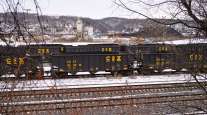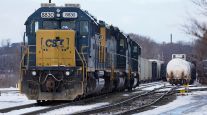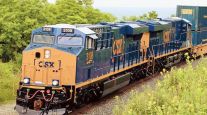Harrison Apologizes to Rail Shippers for Summer Service Disruptions
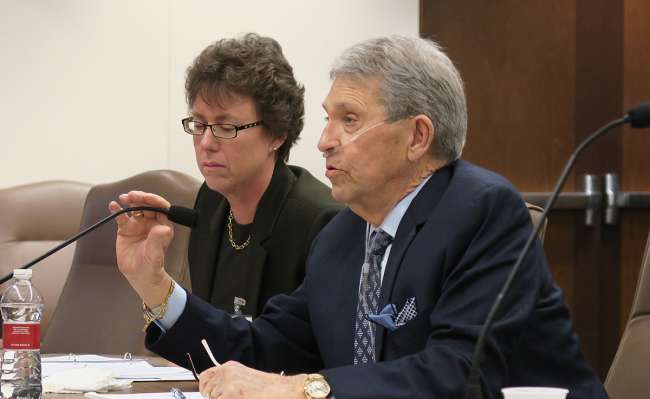
WASHINGTON — CSX Corp. CEO Hunter Harrison apologized to railroad shippers during a recent U.S. Surface Transportation Board meeting, offering federal regulators several explanations for lengthy service disruptions over the summer.
Although Harrison insisted on Oct. 11 that conditions have improved since Labor Day, and defended his precision scheduled railroad concept, his tone was more conciliatory than in prior comments.
“If I don’t accomplish anything else at all today, I want to apologize to our valued shippers. Whatever problems we’ve had — internally we have made some mistakes — this is not a failure of precision scheduled railroading,” he said.
The remarks were in stark contrast to his Aug. 16 response to the Rail Customer Coalition in which he denounced the “many unfounded and grossly exaggerated statements.”
During an extensive question-and-answer session with STB Acting Chairman Ann Begeman and board member Deb Miller, Harrison identified several reasons behind deteriorating service levels.
“I can write all the great architecture, I can put the Xs and Os up there. But if I don’t have someone that can pass it and catch it, I can throw it away,” he said. “People execute, and the best are the ones that execute day in and day out.”
Harrison also acknowledged that laying off 1,000 managers shortly before his arrival may have “overlooked the people side of the ledger.” In addition, he conceded that employee morale took a hit after a shareholder proxy battle in the spring.
He also singled out nine employees who CSX fired this summer for falsifying data to give the impression that a train took a trip that it never did.
“What happened this summer is maybe I got people over-enthused. They thought they could do more than we could and we got ahead of ourselves, maybe,” Harrison said.
But he also proclaimed, “The worst is over and the best is around the corner.”
Railroad shippers, however, painted a different picture, telling the federal regulators that customer service was awful and forced them to shell out more money to secure over-the-road options.
Kevin Acker, strategic relationship and category manager for rail at The Chemours Co., told regulators the company has spent more than $1.3 million in trucking to ensure delivery of critical raw and finished products to its customers. “We will continue to supplement rail shipments with truck until we regain our confidence that CSX can deliver the service that our customers demand,” Acker said.
Kellogg Co. suffered substantial delays at its Pringles plant in Jackson, Tenn. Sharron Moss-Higham, a senior vice president for snack distribution, said that costs have risen 20% in recent months, with Kellogg paying nearly three times more to haul products on bulk trucks as a short-term solution.
She also described a “ping-pong” effect where CSX detoured railcars to locations nowhere near the normal route, a sentiment echoed by at least four other shippers during the hearing.
“Examples include cars in route to Jackson, Tenn. from Illinois turning up in Idaho. Cars being routed from Arkansas to Tennessee showing up in Cincinnati. Cars from Nashville traveling to Jackson showing up in Kentucky. And cars sitting at the plant empty while CSX shows them full and in Indiana,” Moss-Higham said.
Brad Hildebrand, vice president at Cargill, Inc., told regulators that CSX forced his company to shut down operations in Sidney, Ohio on Sept. 30 and Oct. 1, and in Lafayette, Ind. on Oct. 9. He said that the first mile and last mile are critical to them and the source of recent breakdowns.
The local crews are being asked to do more work than they are capable of with the resources that they are given, Hildebrand said. “In a nutshell, [precision scheduled railroad] means doing less with less.”
Smaller, privately-owned shippers experienced crippling delays.
“CSX seems to have a total disregard for customer service and business relationships,” said William Scott, vice president at Collum’s Lumber Products. “When you call someone, you will get their voicemail and it’s a rarity that you’ll get a callback.”
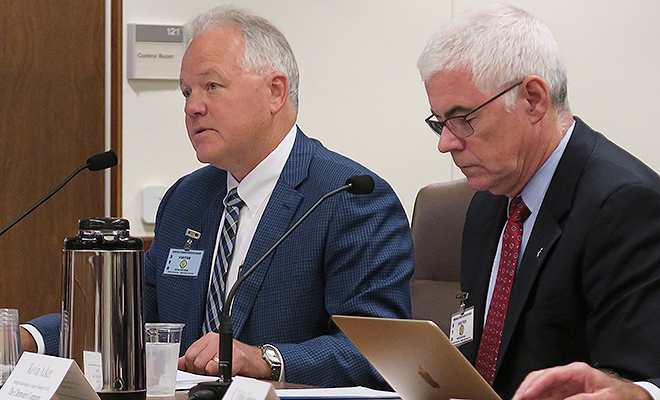
Hildebrand (left) with Acker. (Ari Ashe/Transport Topics)
In a jaw-dropping case, Tom Tirabassi, director of North American logistics at Olin Chlor Alkali Products, said CSX lost a loaded chlorine railcar for four days in late August.
“After repeated Olin inquiries, the subject load was finally located in a CSX yard. I’m sure you can appreciate the serious security concerns,” Tirabassi said.
CSX spokesman Rob Doolittle shared 10 letters filed with the STB expressing optimism that CSX is back on the right track.
“Communication is now more frequent (beginning in August) with network updates on both precision railroading and the clean up after the storm. This is a welcome change from May and I expect going into fall peak, as volume increases, communication on the network will continue to be sent on a regular basis from Jacksonville,” wrote SunTeck TTS Vice President Jeff Brashares.
But shippers countered that service remained far short of acceptable and urged the STB to expedite investigations.
“We need a service remedy counted in days, not weeks or months,” said Greg Jozwiak, Dow Chemical Co. supply chain vice president.


